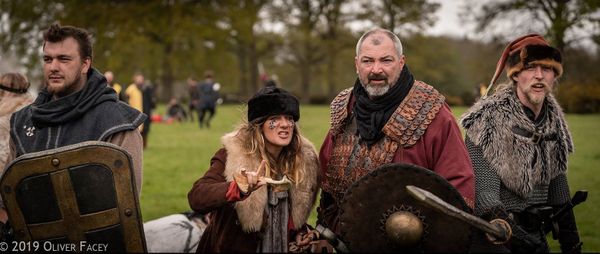Varushka military concerns
No edit summary |
mNo edit summary |
||
| Line 43: | Line 43: | ||
Following months of wrangling, a major rift has grown between the armies of Varushka and those of [[the Brass Coast]] and [[Wintermark]] over the use of pragmatic military strategies. During the Spring Equinox 382YE, the Varushkan people [[Our_choice#Prepare_for_Difficult_Choices|chose to stand]] with the Iron Helms and disregard the criticism of these nations. Whenever a Varushkan army is involved in the same campaign as a Wintermark or Brass Coast army, the [[Campaign_outcome#Victory_Points|victory points]] they generate will be reduced by a tenth. If armies from both nations are present, the penalty will increase to a fifth. | Following months of wrangling, a major rift has grown between the armies of Varushka and those of [[the Brass Coast]] and [[Wintermark]] over the use of pragmatic military strategies. During the Spring Equinox 382YE, the Varushkan people [[Our_choice#Prepare_for_Difficult_Choices|chose to stand]] with the Iron Helms and disregard the criticism of these nations. Whenever a Varushkan army is involved in the same campaign as a Wintermark or Brass Coast army, the [[Campaign_outcome#Victory_Points|victory points]] they generate will be reduced by a tenth. If armies from both nations are present, the penalty will increase to a fifth. | ||
{{Varushka Links}} | {{Varushka Links}} | ||
[[Category:Varushka]] | |||
[[Category:Archetype]] | |||
Revision as of 17:35, 12 August 2021
Overview
Varushka is a dangerous land. The hills and forests between the vales are haunted by monsters. There are great expanses of deep wood and dark rugged wilderness where the rule of law is tenuous at best, which provide havens for brigands, bandits, and sinister cults. Even the vales in the relatively peaceful lowlands ensure that they have plenty of warriors ready to protect them from surprise attacks, and even when traveling on the warded roads a merchant is happier when accompanied by a party of armed and armoured fighters.
The warriors of Varushka are known in the rest of the Empire for their black humour, leather or metal scale armour, vicious axes, and grim determination to get the job done - even if it means doing things that other Imperial citizens may find distasteful.
Schlacta
The schlacta are the most common group of professional soldiers in Varushka. They stand ready to defend the valleys that form Varushkan society. They are the defensive core that shields the people against its enemies, whether those enemies are ravening wolves, rapacious bandits, or rampaging orcs. The schlacta tend to be the best armed and best armoured of Varushkan warriors, but they also tend to see the most combat. As professional soldiers they tend to favour the heavy weapons of war such as broad swords, war axes and bardiches. This sets them apart from other Varushkans who tend to favour weapons that are also tools – the hammer, bow or spear and most especially the woodsman's axe.
Not all schlacta work for a boyar; any organised group of men and women that fights for a living could be called schlacta. Several travelling merchants maintain schlacta to protect themselves and their caravans. There are even mercenary bands of schlacta who offer their protection to others in return for money.
Wagon Raiders and Sell Swords
Mercenary fighters are perhaps more common here than anywhere else other than the League, living rough lives drifting from contract to contract. They are often greeted with distrust by the people of the vales, but when there are bandits that need dealing with or shambling wolves sighted in the nearby woods they rarely lack for employment. Most citizens view them as a necessary evil, however, and any vale that can looks to the boyar's schlacta for defence rather than to itinerant sellswords.
Some particularly brave – or reckless – Varushkans follow the tradition of the wagon raider - indeed some warriors drift back and forth between sell sword and wagon raider as the opportunities present temselves. These opportunists seek their fortunes by launching forays into barbarian lands to grab whatever riches can be found. They live in tight-knit communities of hard-bitten veteran soldiers, forming well-defended wagon trains. The wagon raiders are especially skilled in the use of the great pavise shields, and these hardened gangs are adept at desperate fighting in close quarters. They are also treated with suspicion – there are plenty of stories of wagon raiders who bring back more terrible things than riches when they return from the deep forests.
Warden Fellowships
As well as schlacta, Varushka is home to the warden fellowships who combine martial might with the clever use of amulets, talismans and magical devices to oppose the threats of the Varushkan wilderness. Many wardens are champions of Imperial Law, and they are often seen as romantic, dashing and above all heroic figures by the people of the vales.
Imperial Armies
Varushka fields three imperial armies; the Army of the Northern Eagle, Army of the Golden Axe and the Army of the Iron Helms. In recent years there has been some upheaval in the Varushkan armies as the nation has focused on its heritage in the wake of the reformation of the Iron Helms.
The Army of the Northern Eagle
The soldiers of this army have long experience of fighting along the northern mountains that border the Thule lands. They contain a number of expert mountaineers, ex-prospectors and other specialists who serve as scouts, and have a significant advantage over less-experienced armies when fighting in mountains, forests and marshes. Once the Northern Eagle establishes a presence in a territory, it can prove extremely hard to dislodge.
The first Varushkan General leads the Army of the Northern Eagle, and is appointed (or re-appointed) at the Summer solstice each year.
The Army of the Golden Axe
The history of the army of the Golden Axe is a history of sustained assault, horrible battles and massive losses. The Varushkan soldiers are philosophical - someone has to do the hard work - but also adaptable. They consider themselves good at surviving against odds that would devastate other armies; they are known for ruthlessly crushing all opposition during their slow grinding advance through enemy territory. Pessimism has become the norm for the officers of this army, although their dire pronouncements of failure are often rendered incorrect by their own heroism and fortitude. In recent years they have been driven to embrace legacy of the Vard; to conquer what can be conquered, to bar their door against what cannot be defeated, and to endure what must be endured without flinching.
Furthermore, as of the Summer Solstice 383YE, the Golden Axe is a large army, reinforced by the wealth of Varushka with the aid of the mining families of Moresvah in Karsk..
The second Varushkan General leads the Army of the Golden Axe, and is appointed (or re-appointed) at the Winter solstice each year.
The Army of the Iron Helms
The first army to bear this name fell victim to the budget reforms of Empress Mariika. In 379YE, the Senator for Karov, Maximov Goraniv Strascovich, received authority from the Senate to raise the army. It was completed shortly before the Winter solstice 380YE. The core of the army is made up of former followers of a sovereign known as the Charnel Lord. The Iron Helms are renowned for their cruelty, employing merciless strategy against those they face in war.
The third Varushkan general leads the Army of the Iron Helms army, and is appointed (or re-appointed) at the Spring equinox each year.
Army Orders
Following months of wrangling, a major rift has grown between the armies of Varushka and those of the Brass Coast and Wintermark over the use of pragmatic military strategies. During the Spring Equinox 382YE, the Varushkan people chose to stand with the Iron Helms and disregard the criticism of these nations. Whenever a Varushkan army is involved in the same campaign as a Wintermark or Brass Coast army, the victory points they generate will be reduced by a tenth. If armies from both nations are present, the penalty will increase to a fifth.
Further Reading
Core Brief
Additional Information



